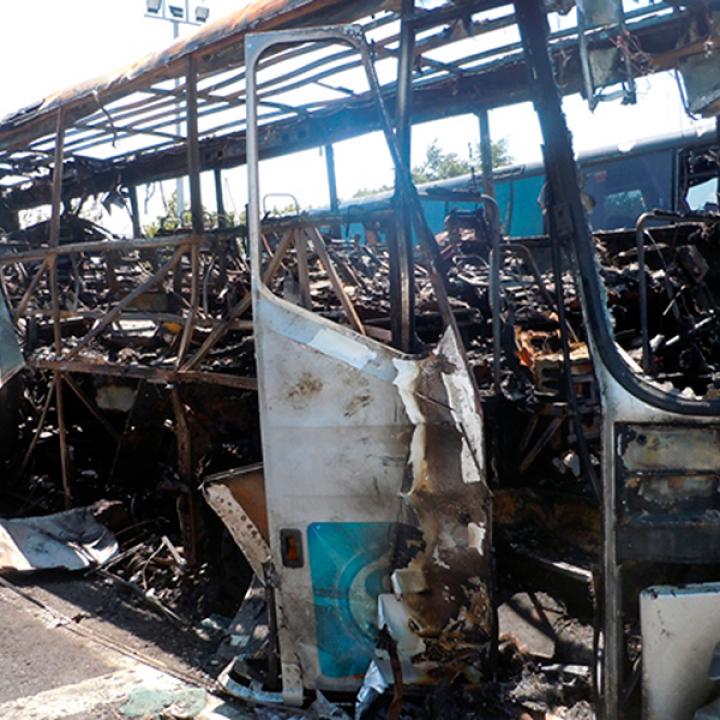

Hezbollah's Bulgaria attack shows that the group and its Iranian cohorts have climbed back up the list of immediate terrorist threats.
The announcement by Bulgaria that the airport bus bombing there last July was likely the handiwork of Hezbollah operatives now has European officials scrambling to decide what, if anything, to do about the fact that the group has now resumed executing attacks on European soil.
In the 1980s, Hezbollah carried out attacks across the continent, and since then it has used Europe as a near-abroad where it could conveniently raise money, procure weapons and provide logistical support for attacks to be carried out elsewhere. But the Bulgarian investigation raises as many questions as it answers. In particular, why would Hezbollah specifically choose to carry out an attack there? And why now?
While it kept up its relentless campaign of military and terrorist activities targeting Israel, and despite unabated tensions with the West, Hezbollah had not carried out a successful spectacular attack targeting Western interests beyond Israel since the 1996 Khobar Towers bombing in Saudi Arabia.
Moreover, as I noted in a report last month, Hezbollah worked hard under former terrorist commander Imad Mughniyeh to establish a measure of independence from Iran. In mid-2008, four months after Mughniyeh's assassination, an Israeli intelligence official told me that "Hezbollah does not always do what Iran wants." But under the leadership of Mughniyeh's successors, Mustafa Badreddine and Talal Hamiyah, Iran's role seems to have hardened again. In February 2012, Director of National Intelligence James Clapper characterized the relationship between Hezbollah and Iran as "a partnership arrangement, with the Iranians as the senior partner." This "strategic partnership," as National Counterterrorism Center director Matthew Olsen put it, is the product of a long evolution from the 1980s, when Hezbollah was just a proxy of Iran. Together, Olsen added, the two entities pursue their shared "aims against Israel and the United States."
To be sure, Hezbollah has engaged in militant, terrorist, criminal, and other activities over the years, from bombings in Argentina and Saudi Arabia to plots in Southeast Asia and Africa. Its ability to continue to do so at pace, however, was severely constrained by an act of terrorism not of its own making. Ironically, al Qaeda's attacks of September 11, 2001, proved to be a turning point for Hezbollah. Desperate not to be caught in the crosshairs of Washington's "war on terror," Hezbollah appears to have decided consciously to roll back its international operations and keep its efforts to strike at Israeli targets as focused and limited as possible. But while spectacular embassy bombings were put on ice, Hezbollah reportedly continued to target Israeli interests, infiltrate operatives into Israel to collect intelligence and carry out operations, and support Iranian interests such as training Iraqi Shiite militants after the fall of the Saddam Hussein regime.
The February 2008 assassination of Hezbollah terrorist chief Imad Mughniyeh led to the resurgence of Hezbollah's international operations arm. When Hezbollah Secretary General Hassan Nasrallah promised Israel an "open war" to avenge Mughniyeh's assassination, Israeli officials quickly took preventive action -- from issuing specific travel warnings to covert disruptive measures -- against anticipated attacks targeting Israeli diplomats or Jewish interests abroad.
But as Hezbollah's Islamic Jihad Organization (IJO) -- now under the command of Badreddine and Hamiyah -- first set out to avenge Mughniyeh's death, Operation Radwan experienced a series of setbacks. Attacks were reportedly thwarted in Azerbaijan, Egypt, Turkey, and in Africa. These failures, plus Iran's own interests in combating threats to its nuclear weapons program, ultimately led Iran and Hezbollah to reassess how they would prosecute -- both separately and together -- a three-tiered shadow war targeting Israeli, Jewish, American, and sometimes British interests worldwide.
At Iran's insistence, Hezbollah are believed to have revitalized the Islamic Jihad Organization's operational capabilities, while Iran's Quds Force is alleged to have targeted Western diplomats worldwide, all intended to deter Western powers from further undermining Iran's nuclear weapons program with computer viruses, defections, and assassinations of key scientists.
As Hezbollah terrorist planners looked to implement this approach, Bulgaria made for an attractive venue for an attack targeting Israeli tourists. Bulgaria had become a popular, inexpensive, and nearby vacation hotspot both for summer beachcombing and winter skiing. In fact, five years earlier, Western intelligence indicated "that Hezbollah chiefs and Iranian intelligence officials had put Bulgaria on a list of nations propitious for developing plots against Western targets." Their first attempt at killing Israeli tourists failed when a suspicious package was noticed on a bus carrying Israeli tourists from Turkey to Bulgaria in January -- just weeks ahead of the anniversary of Mughniyeh's assassination. Six months later, Hezbollah operatives struck again, this time with devastating success, killing five Israelis and a Bulgarian.
Several other nearly identical Hezbollah plots have been thwarted worldwide, from Cyprus to South Africa and Thailand to Greece. At the same time, efforts by Iran's Quds Force aimed at Western diplomatic targets continue.
The net effect of Iran's shadow war against the West, as I noted in my report, is that Hezbollah and the Quds Force have climbed back up the list of immediate threats facing the United States and its allies. In July 2012, Olsen warned that while Iran and Hezbollah had not yet hit targets in the United States, U.S. officials worry that could soon change. "We're seeing a general uptick in the level of activity around the world," he noted, according to Wired, adding that "both Hezbollah and the Quds Force have demonstrated an ability to operate essentially globally."
In fact, the Hezbollah-Quds Force threat has sometimes eclipsed that of al Qaeda. Olsen reportedly continued: "There are times when we are briefing the White House [on terror threats and] at the top of the list are Hezbollah or Iran."
Matthew Levitt directs the Stein Program on Counterterrorism and Intelligence at The Washington Institute.
CNN Global Public Square


